‘Iron fist’: Govt blasted as protest law passes
UPDATED: The Malinauskas Government has defended itself against fierce union and crossbench criticism after its law introducing hugely increased penalties for obstructive protest passed the Upper House, calling it a “victory for common sense” as a national human rights group flags a possible High Court challenge.

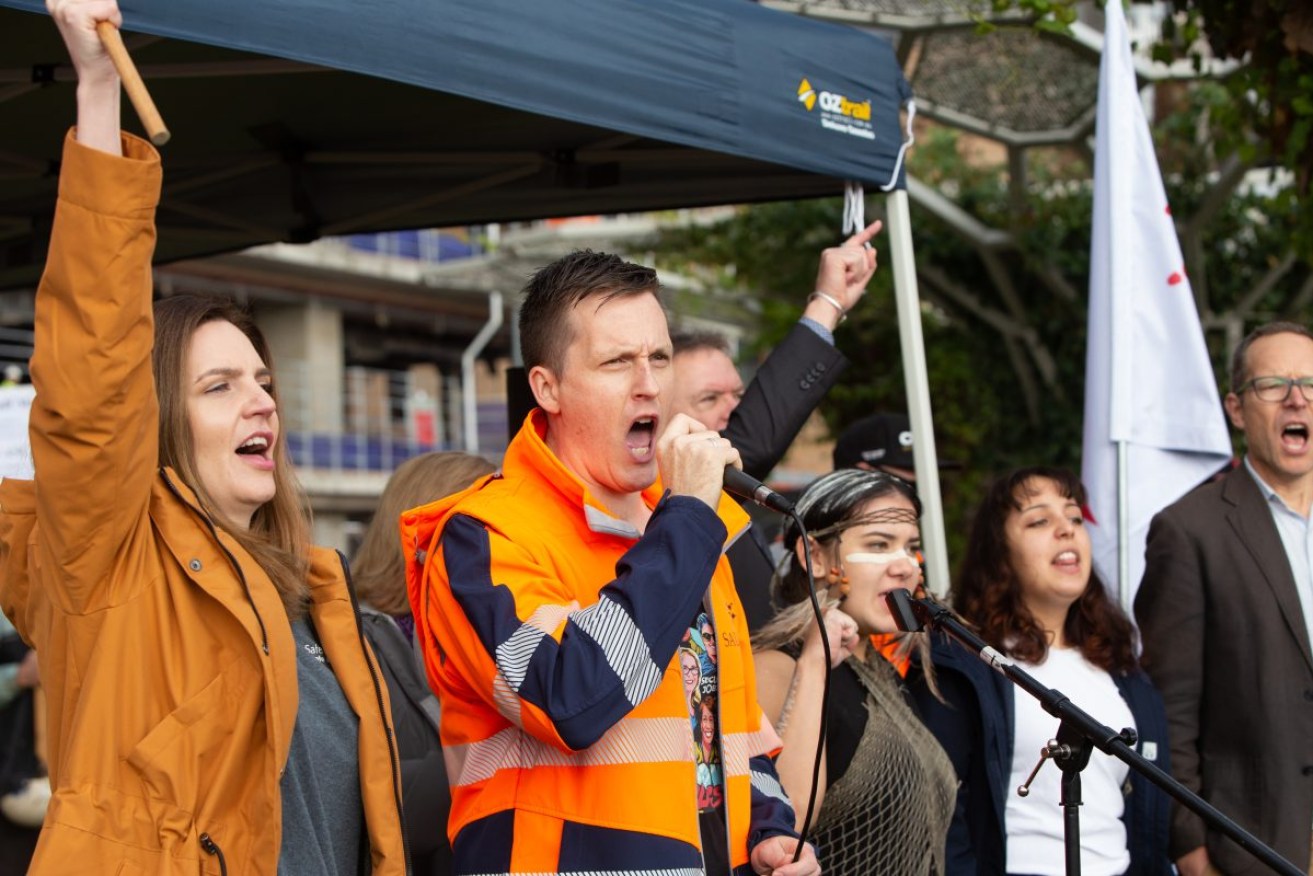
SA Unions secretary Dale Beasley addresses a protest rally before the bill was debated in the Upper House. Photo: Brett Hartwig/InDaily
The Summary Offences (Obstruction of Public Places) Amendment Bill 2023 was passed shortly before 7am today with Labor and Liberal support after a marathon 14-hour debate in the Upper House.
The contentious legislation, opposed by wide sections of the union movement and civil society groups, will increase the maximum penalty for obstructing a public place from $750 to $50,000, or three months jail. The punishment is at the discretion of the courts.
The Malinauskas Government introduced the Bill on May 18 in the Lower House where it passed with bi-partisan support in 22 minutes, following a traffic-stopping Extinction Rebellion protest in the city the day before.
The final amended Bill passed the Upper House 13 votes to 4. Crossbench parties SA-Best and the Greens voted against.
Debate on the Bill started just before 4.15pm on Tuesday and the legislation was passed at 6.54am on Wednesday.
“This is a victory for common sense,” Premier Peter Malinauskas said later, adding that existing penalties for public obstruction hadn’t changed in decades and “no longer provide an adequate disincentive to lawbreakers”.
“We’ve seen Extinction Rebellion activists travel the country with the sole intention of breaking the law, then crowdfunding to pay their fines,” he said.
This legislation protects the rights of protesters, while also protecting the rights of other citizens who wish to go about their lives without being unfairly inconvenienced.”
During Upper House debate on the Bill, SA-Best MLC Frank Pangallo spoke for more than five hours while Greens MLC Robert Simms filibustered for nearly three hours.
No Labor MLCs crossed the floor or expressed concerns about the Bill on the floor of parliament, despite crossbenchers repeatedly airing claims that government MPs had privately expressed reservations about the legislation and did not fully support the crackdown.
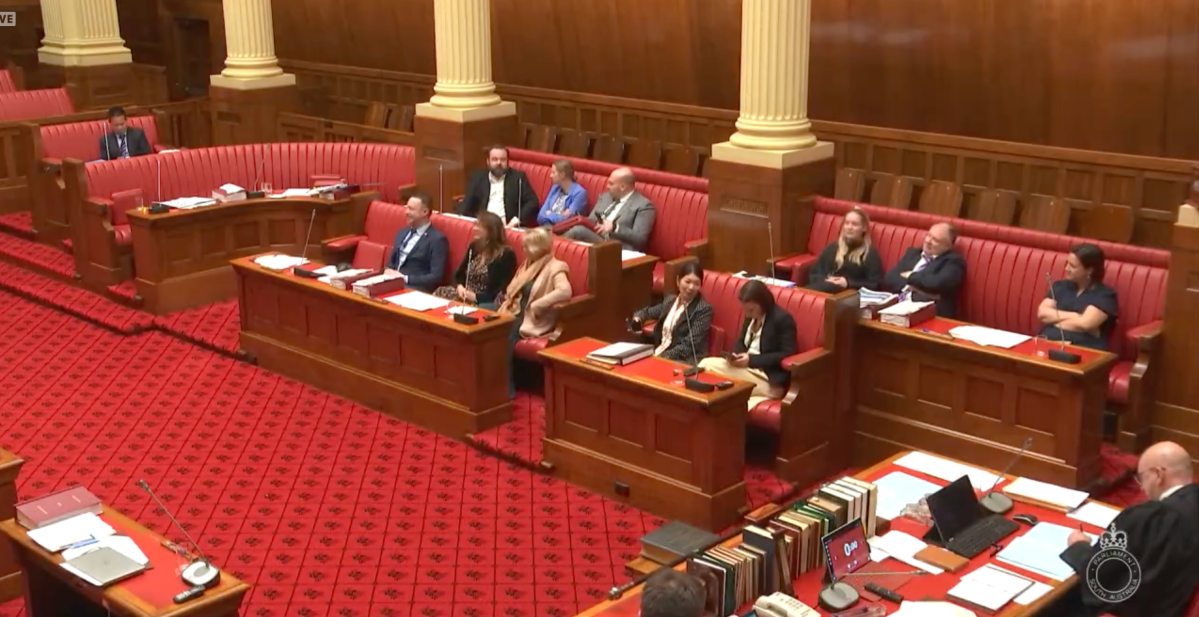
Labor and Liberal MLCs voting in support of the legislation in the early hours of this morning. Photo: Parliament of South Australia live stream
SA-Best and the Greens moved a series of unsuccessful amendments to the legislation overnight, including bids to send it to a committee for examination, give it a 12-month expiry date, introduce a “reasonableness” clause for public obstruction and remove wording which included “indirectly” obstructing as well as directly.
The state government also rejected pushes from the Greens to require the Attorney-General to produce a review of the reforms in 12 months’ time and an invitation for the state’s Aboriginal Voice to Parliament to review the legislation.
Another amendment to reduce the maximum penalty from $50,000 to $5000 was rejected.
However, the government agreed to three amendments, including one which removes “reckless” intent from the definition of obstructing a public place.
“We accepted those amendments because they didn’t offend the government’s core objective here which is to increase the penalties,” Premier Peter Malinauskas told reporters today.
The Premier has repeatedly said the legislation does not impact the Public Assemblies Act 1972 which governs the right to protest in South Australia.
Asked what he had learned from the process, he said: “In politics, nothing is ever easy.”
“But my view is you’ve always got to look at objective reason and facts and the advice that you receive and contemplate it thoughtfully.
“I don’t know if everybody that’s contributed to this debate has necessarily done the same thing, I’ve seen some patently absurd conspiracies.
“The government’s job is absolutely to protect people’s right to protest – we have done that – but we’ve also got a job to protect the rights of everyone else in the community who just wants to get on with their daily lives.”
High Court challenge flagged, SA Unions deem law ‘unacceptable’
Australian human rights organisation the Human Rights Law Centre (HRLC) said today it is “highly likely” the state government’s new laws will be subject to a High Court challenge.
HLRC senior lawyer David Mejia-Canales, a prominent opponent of the legislation, said the High Court challenge would relate to the implied freedom of political communication in the constitution.
“The challenge would be looking at the laws that were passed and… whether they impinge on the right, on the implied right, of political communication of the Constitution,” he told InDaily.

David Mejia-Canales. Photo: Twitter
“We’ve received advice that it could be a person that may be charged under the laws, or it could be someone who was going to protest but now feels like they can’t because the penalty is excessive.”
Mejia-Canales said the HLRC has run similar High Court cases in the past and this case was something “we would be really happy to think about”.
Attorney-General Kyam Maher played down the potential for a High Court challenge this morning.
“I think if the law as it currently stands doesn’t offend the constitution, then we don’t accept the law as amended will necessarily offend the constitution,” he told parliament.
Meanwhile, the state’s peak trade union body, SA Unions, this morning described the Labor government’s process for passing the new laws as “galling”.
Union secretary Dale Beasley, who yesterday rallied alongside more than 15 other unions against the legislation, said the union movement “will not accept that this is how laws are made in South Australia”.
“SA Unions is deeply concerned that the government have decided to ignore the weight of opposition in the community and the legal profession and proceed with ramming these anti-protest laws through the Legislative Council,” Beasley said.
The hasty passage of this Bill serves as a reminder that the rights of workers and the community, while hard won, can be easily lost.
“The government had an opportunity yesterday to defer the Bill for proper consultation, it’s galling that they refused to do so”
Marathon debate in the Upper House
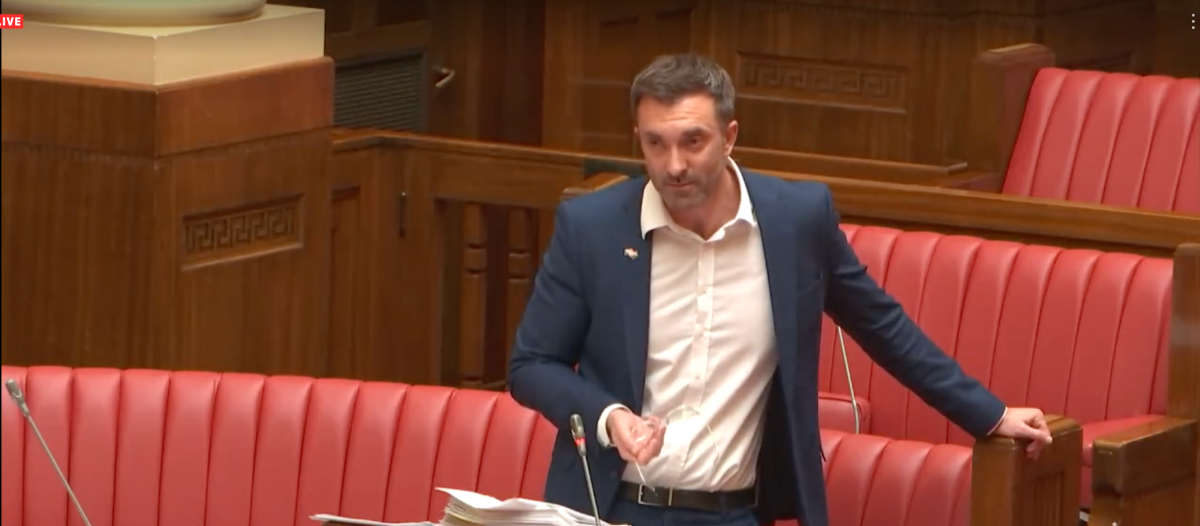
Greens MLC Robert Simms spoke for nearly three hours opposing the Bill. Photo: Parliament of South Australia live stream
Opposition frontbencher Michelle Lensink opened the Upper House’s debate on the new protest Bill shortly after 4.15pm on Tuesday with a five-minute contribution expressing the Liberal Party’s support for the Bill.
This was followed by a three-minute speech from One Nation MLC Sarah Game, who was opposed to the Bill.
Greens MLC Robert Simms then spoke for nearly three hours opposing the Bill in a speech that tracked history of protest back to Ancient Rome in 493 BC to the modern day.
Simms’ speech ran from 4.25pm to 9.07pm, only interrupted by a 90-minute dinner break for the Upper House.
SA-Best MLC Frank Pangallo then took the floor and spoke for more than five hours, accusing the Premier of attempting to “appease some loud mouths in the media and on talkback” with the new laws.
He also said he had been told there was a “handful” of Labor MPs who expressed reservations about the Bill when the Premier presented it to caucus.
“When the captain-coach walked into the party room with the draft tucked under his arm, the team had no idea what the gameplan was,” Pangallo said.
“Yet, to their credit, I’m told there were a handful who questioned it and expressed their reservations in the Labor party room.
“However, democracy was a serious caucus casualty on this occasion – this from the same party that takes to streets to champion our labour force each year.”
Pangallo wrapped up just before 2.30am to hand over to fellow SA-Best MLC Connie Bonaros, who delivered a fiery speech taking aim at the Labor Party for an “offensive and hideous piece of legislation”.
Speaking for nearly two hours and wearing an “arrest me Pete” shirt, Bonaros questioned why the government had not allowed its backbenchers to take a conscience vote on the Bill and accused the party of betraying its rank-and-file members.
“My first question to the Labor government on this bill is: Where’s your conscience vote now?” she said.
“We see it rolled out on abortion, we see it rolled out on euthanasia, we see it rolled out on gender issues, but on something as fundamental as this, you rule with an iron fist.
“Labor voters should be horrified tonight that their Premier has silenced these MPs into submission.”
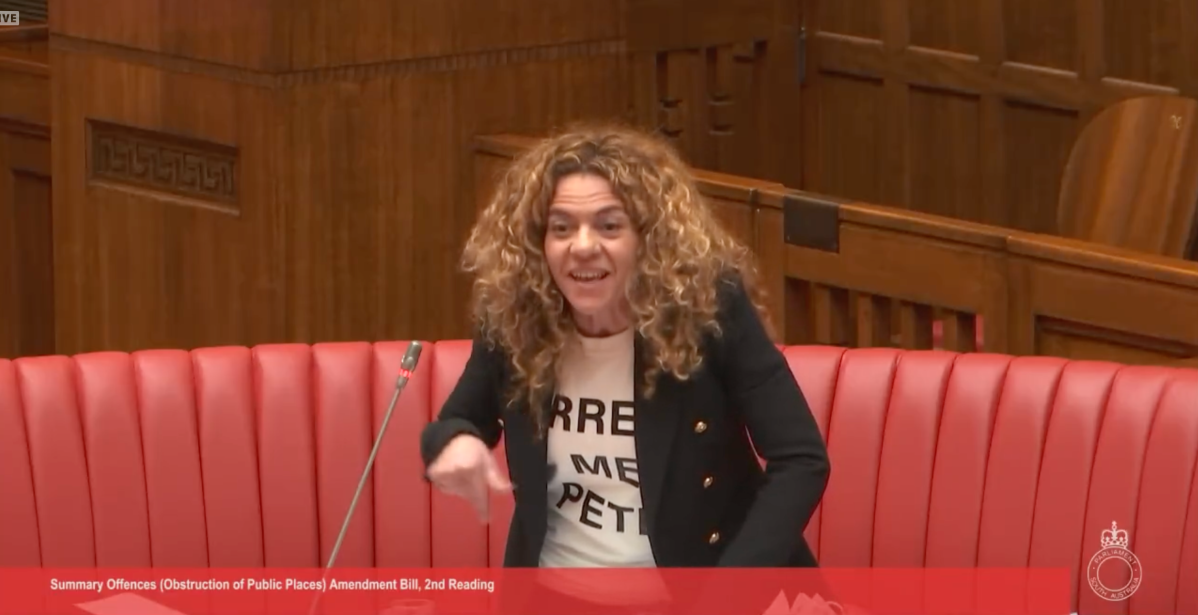
SA-Best MLC Connie Bonaros fiercely criticised Labor MPs during a nearly two hour speech given after 2.30am. Photo: South Australian Parliament live stream
She also repeated Pangallo’s claims that the government was proceeding with the legislation without the support of all its MPs.
“How the Premier, after the changes to the Return to Work laws earlier this year, can go out again… and have a second crack at the same rank and file members that saw him placed in position as leader of this state, absolutely beggars belief,” she said.
“The fact that the rest of his members of parliament, the rest of his backbench, frontbench… can sit their quietly and say nothing about what their Premier is doing, it’s a shame.
“It is extraordinary that the leader of this state… would consider it appropriate to do what he did without the blessing of his entire party.
You can tell me you’ve got the blessing of your party, but I walk these corridors and I talk to your members – all of your members – just as much as you do, and I know that’s not true.
Bonaros wrapped up shortly after 4.30am and handed the floor to Greens MLC Tammy Franks, who spoke for around half an hour.
She tabled advice from the Courts Administration Authority that no one has been convicted under Section 58 of the Summary Offence Act in the last five years.
“I’m not quite sure why we have identified this particular part of the Summary Offences Act for special attention to have the fines and penalties increased, when in fact we haven’t seen it go through to a conviction once in the last five years,” she said.
The Attorney-General concluded the debate at around 5am, acknowledging that “it is clear there are different views”, before the Bill entered the committee stage for discussion about amendments.
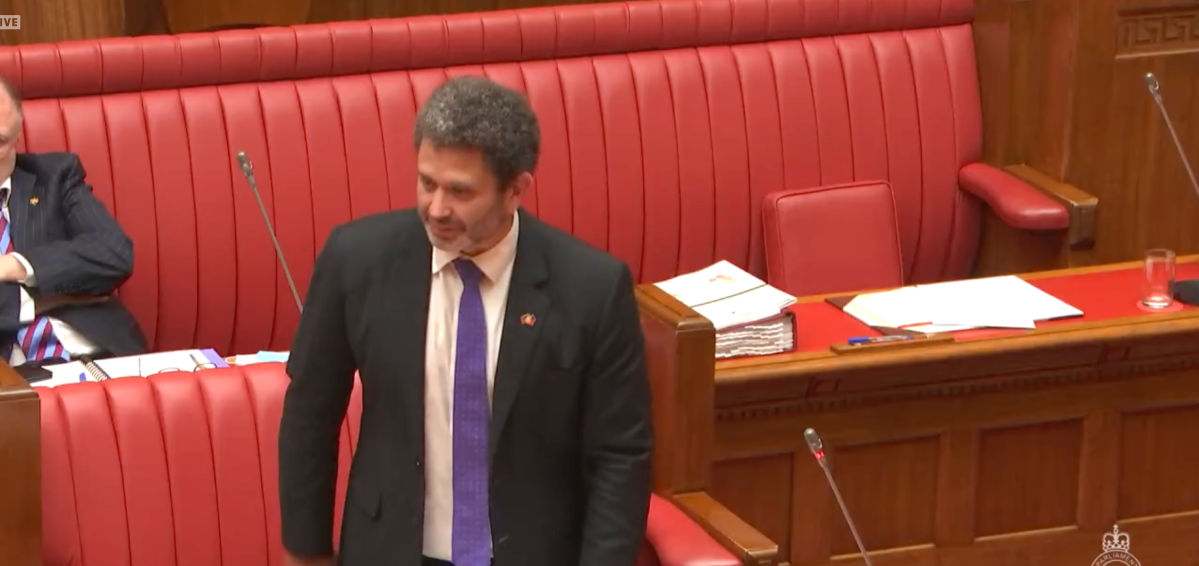
Attorney-General Kyam Maher summing up debate shortly after 5am this morning. Photo: Parliament of South Australia live stream.
During this stage, crossbenchers repeatedly questioned Maher about what consultation occurred before the Bill was introduced in the Lower House.
This included questions about whether the Premier met with the Opposition Leader, if he showed the Police Commissioner the Bill before it went to parliament, and how the government settled on
Maher batted away all of those questions, saying he was “not going to traverse into the internal development of the Bill”.
“Ministers haven’t before me and I don’t intend to set a precedent talking about the internal development of the legislation,” he said.




